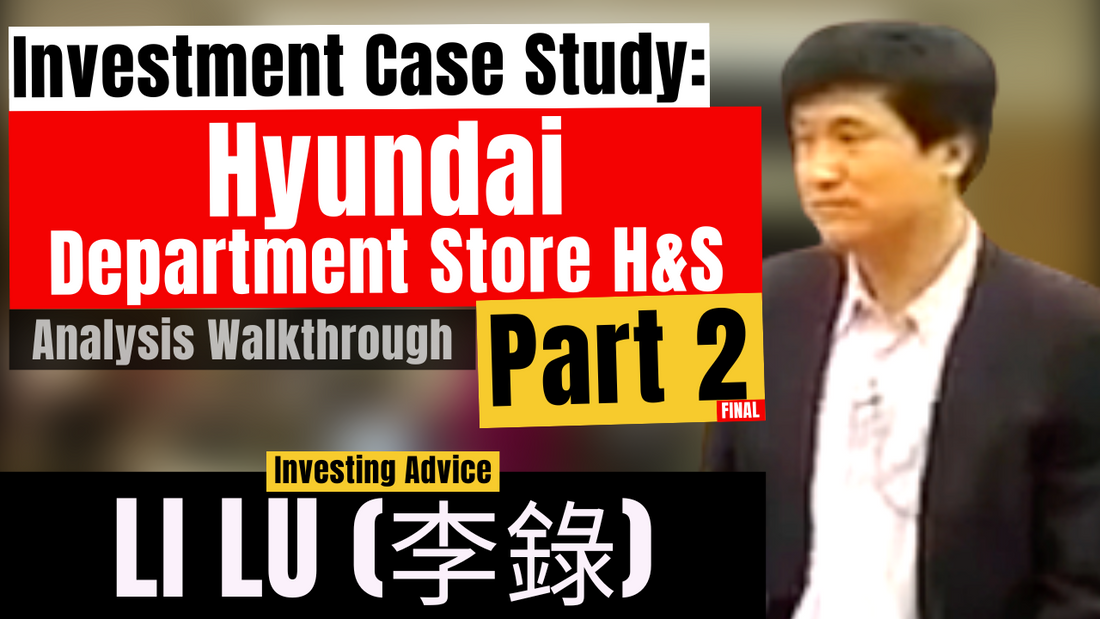
Hyundai Department Store H&S Part 2, Analysis Walkthrough - Li Lu | CBS 2006【C:L.L Ep.24】
[Transcript]
LI LU: Okay, so – now, here’s the basic thing you come out of this one, okay?

So this one does not gave you a whole bunch of different information right? It tells you roughly its trading at 60 million dollars in market cap. It has roughly about 30 million dollars in pre-tax earnings, and it has about 70 million – (BROKEN AUDIO) – roughly 180 million dollars in fixed assets, come up with 240 or so million in book value.
So what does it tell you? What do you do next? You look at that one, it took you 5 minutes, you got this one. What do you do next?
What?
AUDIENCE MEMBER: Figure out why is it so cheap?
LI LU: How do we know it’s cheap? We’re thinking it might be cheap. But you're not – it’s not conclusive yet. You have to go next, to find out what exactly – What is the earnings? What is the book? What is the constitution of working capital? What is in the fixed (assets)? Right?
Now, I'm just basically using common sense, common logic, I mean this is something you have to really think, you don't have to go through any, you know, this is sort of you still kind of, you know, saveable if you will.
You know, that's why all my employees ever had really never went to business school and never worked for a kind of establishment management firm and some of them never had accounting because I find it easier to train them than somebody who did. And clearly, it hasn't really demonstrated here.
I mean, if you sort of go through if they’re teaching the right way, you should be able to tell right away what it is. Okay, so we did some work and it really takes no time. Of the 70 million in current asset, you know how much is – is all cash, (marketable) securities, tradable securities. Of the 180 million in so-called "fixed income," well, they recorded they own 100% of a hotel – they recorded 30 million as a book – they also own 13% of a department store which recorded on the book for 30 million, it just so happened that department store is next page. So it’s easy for me to find.
I turn the page around, I find the department store, I discovered it is roughly had a market cap of a 600 million. So 13% roughly gives me what?
What?
AUDIENCE MEMBER: ~80 million.
LI LU: Roughly 80 million so the book really underestimate the value by another 50 million. And they also own three cable companies in a mid 10 percentage and they also (own) a whole bunch of real estate.
And next I look at that department store they look at. Boy, it has exactly the same profile. They're trading roughly around the cash and security they own, about 2-3 times their earnings and they own a whole bunch of different asset. Turns out they are the second largest cable operator as well.
And the next thing I learn is that this department store really function more like a hotel. It’s not a department store that we understand here. They don't take any inventory, they basically provide is more like a shopping mall. And they charge it by taking a percentage off the top line of all the merchants that sell their stuff there.
Okay, so you add it all up and here is what you have;
Okay, you're paying 60 million dollars (market cap), you have 70 million dollars in cash – this is no debt – 70 million dollars in cash, you have another 100 million in stock, how much is that? 170 million.
You know, 30 million dollars is a hotel, the value hasn't been changed over the last 10 years. And real estate in (South) Korea had gone up dramatically over that same period of time. I went to (South) Korea and look at the hotel. I looked at all their department stores, it looks quite decent to me. I check the recent transactions of all the things in the neighborhood. They all indicate me that their value is more like 2, 3, 4 times of what is on the book.
Supposedly I take it on the book. Let's add another 150 million. How much do we have right now? Roughly 320 million or so. Which I've paid a 60 million and besides, I have earnings about 30 million dollars a year.
What did I miss? Yes?
AUDIENCE MEMBER: Corporate governance.
LI LU: Good question. What about it?
AUDIENCE MEMBER: (Inaudible).
LI LU: Any evidence that could happen?
AUDIENCE MEMBER: (Inaudible).
LI LU: Right.
AUDIENCE MEMBER: (Inaudible).
LI LU: Terrific point. Absolutely great point. Anything else?
AUDIENCE MEMBER: All your assets are also about 100 kilometers from nuclear bomb so that's not really secured.
LI LU: Great point. Anything else?
AUDIENCE MEMBER: Governmental regulations could hurt you. For example like three electrical towers which had a –
LI LU: Right.
AUDIENCE MEMBER: – government said, you know, lower prices would have basically lost money.
LI LU: Right. Anything else?
AUDIENCE MEMBER: Even the lawsuit liability...
LI LU: What?
AUDIENCE MEMBER: Liability because of lawsuit, you know...
LI LU: What kind of lawsuit?
AUDIENCE MEMBER: It could be lawsuit from the customers or from the shareholders or it could be from the suppliers, you know.
LI LU: That could happen to any company right? Your reason is specifically this company or any company?
AUDIENCE MEMBER: Any company.
LI LU: Okay. Anything else?
So far I haven't heard anything about local market as if the only guy who really bother about this are foreign investors. What about the local market? What about what other investors are seeing and looking and thinking?
AUDIENCE MEMBER: Better landscape like for that area.
LI LU: Good point. Look at it. That's why I give it to you, I thought you're gonna do it. Yes?
AUDIENCE MEMBER: (Inaudible).
LI LU: What's that?
AUDIENCE MEMBER: Small market cap.
LI LU: Absolutely, and how much does it own by the insiders? Oh you don't have it there. It’s about 50%.
You got a whole bunch of different things against you. You also have a whole bunch of different things that really in your favor. You have to go through all of it, each one, and think rationally and carefully.
You have to add to that list of the attitude of the local investors – the other people were buying – because there's nobody from foreign that really own this damn thing, if you check that. So you go through all of that and we don't have the time to go through all of that, but you should.
And then you come up with a solution – I mean, come up with your decision, as I have, now I sort of own it. And what happens to the stock since?
Well again, nobody has any computer or whatever you can check?
Okay, so I have two charts that I print out directly from Bloomberg;

One is that the department store, it was traded somewhere around 22, last I checked it went to about a hundred.

And then this one (Timberland Co.) start was 12, last I checked is around 70 something.
Each went up about 5-6 times.
(Source: https://youtu.be/y3c2PKupiu8)
[YAPSS Takeaway]
Forget complicated things you learned in business school, just use common sense and common logic, and investigate the company like a journalist.
